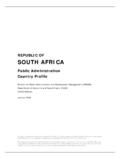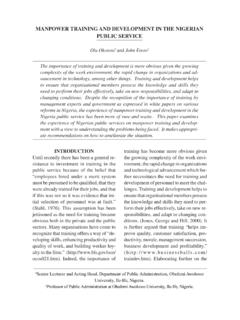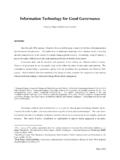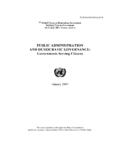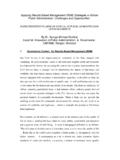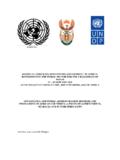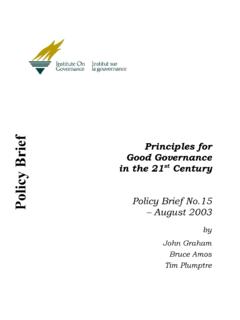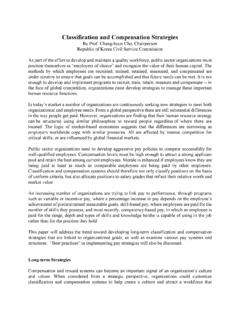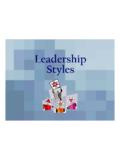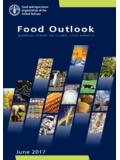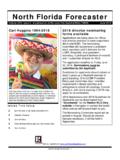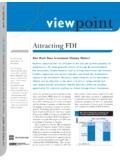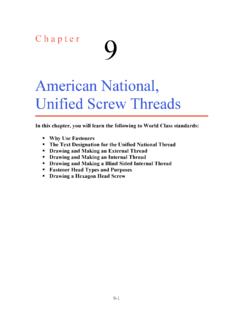Transcription of A Brief History Of DECISION MAKING - United Nations
1 A Brief History Of DECISION MAKINGB ased on Leigh Buchanan and Andre O Connell, in Harvard Business Review, , Meeting of Romance of the History of Choice1. Introduction Life is the sum of all your choices Albert CamusHistory equals the accumulated choices of all mankindDecision MAKING Chester Barnard imported the term from the lexicon of public administration into the business world Replace narrower descriptions such as resource allocation and policy MAKING Introduction of the phrase changed how managers thought about what they did DECISION implies the end of deliberation and the beginning of action. Prof. William Starbuck, University of OregonThe study of managerial DECISION MAKING (1) Foundation laid by Chester Barnard, James March, Herbert Simon and Henry Mintzberg DECISION MAKING within organizations only one ripple in a stream of thoughts flowing back to a time when man facing uncertainty sought guidance from the stars The question of who makes decisions and how have shaped the world s systems of government, justice and social orderThe study of managerial DECISION MAKING (2) A palimpsest of intellectual disciplines: mathematics, sociology, psychology, economics and political sciences, etc.
2 Philosophers ponder what our decisions say about ourselves and about our values Historians dissect the choices leaders make at critical juncturesDecision MAKING A good DECISION does not guarantee a good outcome Improved through a growing sophistication with managing risk, a nuanced understanding of human behaviour and advances in technology that support and mimic cognitive processesContextual and psychological constraints exist On the ability to make optimal choices Complex circumstances, limited time and inadequate mental computational powers reduce DECISION MAKING to a state of bounded rationality ; People can make economically rational decisions if only they can gather enough information Herbert Simon Daniel Kahneman and Amos Tversky identify factors that cause people to decide against their economic interest even when they know better Antonio Damasio draws on work with brain damaged to demonstrates that in the absence of emotion it is impossible to make any decisions at all Erroneous framing, bounded awareness, excessive optimism.
3 The debunking of Descartes s rational man threatens to swamp our confidence in our choices, with only improved technology acting as a kind of empirical breakwaterImperfectability of DECISION MAKING Theorists sought ways to achieve if not optimal outcomes, at least acceptable ones Mastering simple heuristics, a fast and frugal reasoning to make virtue of our limited time and knowledge Gerd Gigerenzen Humble DECISION MAKING an assortment of nonheroic tactics that include tentativeness, delays ands hedging Amitai Etzioni In a high-powered round of rock-paper-scissors, a game that date as far as as Ming Dynasty in China, a Japanese TV equipment manufacturer turned over its US$20 million art collection to Christie when it beat archrival Sotheby 2.
4 Chances AreRisk An inescapable part of every DECISION Organizations must calculate and manage the attendant risks to make good choices In the past, risk management tool kit consists of faith, hope and guesswork; before the 17thcentury, humankind s understanding of numbers wasn t up to the task Today, myriad sophisticated tools can help managers make good choicesNumbering Methods The Hindu-Arabic numeral system (which radically include zero) simplified calculations and enabled philosophers to investigate the nature of numbers During the Renaissance, scientists and mathematicians such as Girolamo Cardano thought about probability and developed puzzles around games of chance; in 1494 a Franciscan monk named Luca Pacioli proposed the problem of points for dividing the stakes in an incomplete game In the 17thcentury, French mathematicians Blaise Pascal and Pierre de Fermat developed a way to determined the likelihood of each possible result of a simple game, Scientific basis of risk management (1) In the 18thcentury, Swiss scholar Daniel Bernoulli studied random events, focusing not on the events themselves but on human beings who desire or fear certain outcomes to a greater or lesser degree (also introduced the concept of human capital)
5 He wanted to create mathematical tools to estimate prospects from any risky undertaking in light of specific financial circumstances , given the chance of a particular outcome, how much are you willing to betScientific basis of risk management (2) In the 19thcentury, Carl Friedrich studied the bell curve of normal distribution, Francis Galton came up with the concept of regression to the mean while studying generations of sweet peas- he later applied the principle to people observing that few of the sons, and fewer of the grandsons of eminent men were themselves eminent In 1921 Frank Knight distinguished between risk (when the probability of an outcome is possible to calculate (or is knowable), and uncertainty, when the probability of an outcome is not possible to determine (or is unknowable)Scientific basis of risk management (3) In the 1940s, John Neuman and Oskar Morgenstern developed game theory, which deals in situations where people s decisions are influenced by unknowable decisions of live variables (aka other people) Today corporations uses modern techniques such as derivatives, scenario planning, business forecasting and real options But since chaos so often triumphs over control, even centuries worth of mathematical discoveries can only do so much Life is a trap for logicians.)
6 Its wildness lies in wait. Chesterton3. The Meeting of MindsNobility in the people pooling their wisdom and MAKING decisions that are fair and acceptable to all In the 5thCentury Athens became the first (albeit limited) democracy In the 17thCentury, the Quakers developed a DECISION MAKING process that remains a paragon of efficiency, openness and respect In 1945, the United Nations sought enduring peace through the actions of free peoples working together During the last century, psychologists, sociologists, anthropologists and biologists unlocked the secrets of cooperation within groups Later the popularity of high-performance teams fostered the collective idealScientific study of groups (1) Began in 1890s as part of the field of psychology In 1918, Mary Parker Follett in The New State: Group Organizations The Solution of Popular Government made case for value of conflict in achieving integrated solutions Breakthrough in understanding of group dynamics occurred just after WWII when Kurt Lewin field theory posited that actions are determined in part by social context and that group members with different perspectives will act together to achieve a common goal Scientific study of groups (2) Over the next decades knowledge about groups and teams evolved rapidly Victor Vroom and Philip Yetton established the circumstances under which group DECISION MAKING id appropriate R.
7 Meredith Belbin defined the components required for successful teams Howard Raiffa explained how groups exploit external help in the form of mediators and facilitators Peter Drucker suggested that the most important DECISION may not be made by the team itself but rather by management about what kind of team to useThe downside of collective DECISION MAKING Consensus is good unless it is achieved too easily Irving Janis coined the term group think in 1972 to describe the mode of thinking that people engage in when they are deeply involved in a cohesive in-group when members strivings for unanimity override their motivation to realistically appraise alternative courses of action Poor group decisions of often attributed to the failure to mix things up and question assumptions Decisions reached through group dynamics require, above all, a dynamic group To think is to differ Clarence Darrow4.
8 Thinking MachinesElectronic computing The philosopher's stone that alchemized the ideas of Herbert Simon, Allen Newell, Harold Guetz-kow, Richard M. Cyerts and James March at Carnegie Institute of Technology (CIT) who were studying organizational behaviour and the workings of the human brain They were envisioning how the new tools might improve human DECISION MAKING Scientists from CIT, MIT and Stanford produced early computer models of human cognition the embryo of artificial intelligence (AI)Artificial Intelligence (AI) Intended both to help researchers understand how the brain makes decisions and to augment DECISION MAKING processes for organizations DECISION support systems targeted the practical needs of managersExecutive Information Systems Proposed by John Rockart to provide data about key jobs that the organization must do well to succeed Launched a breed of technology specifically geared toward improving strategic DECISION MAKING at the top Business intelligence systems that help DECISION makers throughout the organization understand the state of the company s worldTechnology-aided DECISION MAKING In the 1990s customers started using the Internet.
9 Giving them more power to choose from whom to buy Customers did not have to factor in zillions of calculations into their choices The newfound ability of customers to make the best possible buying decisions is the technology s most significant impact to date on corporate success or failure5. The Romance of GutGut and Guts Gut emotional response Guts fortitude, nerveGut DECISION MAKING In recent years instinct appears ascendant Pragmatists act on evidence, Heroes act on guts Intuition is one of the X factors separating the men from the boys Testify to the confidence of the DECISION maker Made in moment of crisis when there is no time to weigh arguments and calculate the probability of every outcome; made in situations where there is no precedent and consequently no evidence, sometimes made in defiance of evidenceIntuition DECISION makers have good reasons to prefer instinct In a study, executives said they use their intuition as much as their analytical skills, but credited 80% of their success to instinct Henry Mintzberg explains that strategic thinking calls for creativity and synthesis and this is better suited to intuition than to analysis A gut is a personal.
10 Non-transferable attributeGut/Brain dichotomy Largely false few DECISION makers ignore good information when they can get it and most accept that when they can t get it they will have to rely on instinct Behavioural economists describe natural mistakes our brains are heir to There are many examples of many good business people who have made bad guesses People with high levels of personal mastery .. cannot afford to choose between reason and intuition, or head or heart, any more than they would choose to walk on one leg or see with one eye. Peter Senge, The Fifth Discipline A blink, after all, is easier when you use both eyes. And so is a long, penetrating stare. 6. A History of ChoiceA History OF CHOICE The History of DECISION MAKING is long, rich and diverse The following timeline represents only a small sample of the people, events, research and thinking that contributed to
